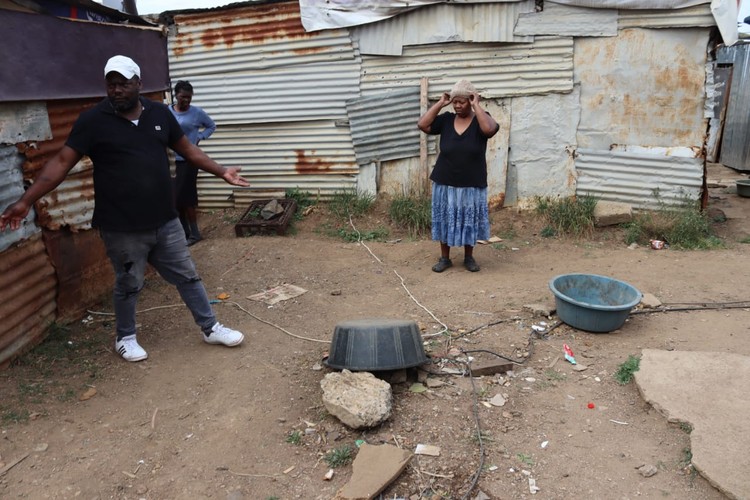
7 September 2023
Thembeni Ndlovu’s three-year-old grandchild was electrocuted here in 2021 by an izinyoka electricity connection. She and other residents of the settlement want safe electricity to their shacks. On the left is community leader Nkosinathi Mabaso. Photo: Nyakombi Manqulo
A few broken pieces of chipboard and plastic buckets cover a web of long black cables on the ground outside the shack of Thembeni Ndlovu at Zone 14 informal settlement in KwaMashu, Durban.
This is where her three-year-old grandchild was electrocuted and died in March 2021. Ndlovu says she constantly worries about her two other grandchildren who have no other safe spaces to play.
“ My grandchildren are still exposed to the dangerous izinyoka,” she says. “At least community members have managed to install toilets and water. The only thing we want now is electricity.
Not far from Ndlovu’s home is that of Nompumelelo Mhlongo. She has lived there since 2008. Her son was also electrocuted and died, just three months after Ndlovu’s granddaughter.
“He was everything to me,” Mhlongo says.
“We are still living under the same conditions. We are always trying to be careful.”
Densely built Zone 14 informal settlement is home to hundreds of people in about 200 shacks, according to community leaders. Most are unemployed or have piece jobs and rely on illegal connections for electricity.
“One thing I can tell you is that our municipality does not care about us,” said community leader Nkosinathi Mabaso. “This informal settlement has been here a long time, and for the past 20 years I’ve been living here, nothing much has been done when it comes to service delivery.”
Municipal spokesperson Gugu Sisilana said eThekwini cannot provide permanent services for Zone 14 residents because the shacks have been erected on privately-owned land.
“The municipality continuously warns residents against electrical theft as it always results in devastating and tragic consequences such as loss of life.”
Sisilana said the Zone 14 informal settlement is right at the edge of a dam that belongs to the private owner. She said the municipality is not mandated to electrify the shacks. “We have sent a letter to the land owner to inform them of the illegal occupation on their land and the steps they must take on the illegal use of electricity in the area.”
GroundUp’s attempts to find out who the land belongs to were unsuccessful. Senior communications officer Princess Nkabane said the municipality could not disclose the owner’s name because of the Protection of Personal Information Act.